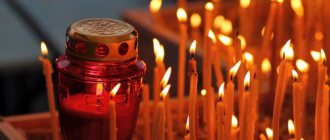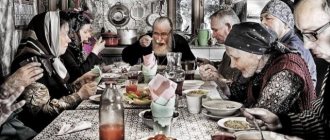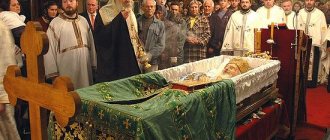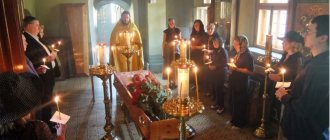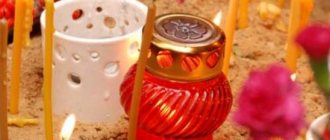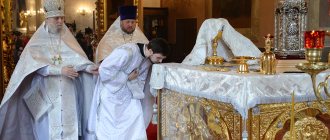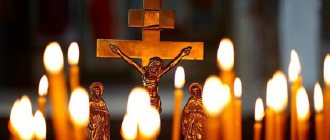Death always comes unexpectedly for each of us, even if you were prepared for the fact that the person is sick and there will be no other outcome of the situation. But even after he is gone, we will not stop remembering him. In Orthodoxy there are some rituals for remembering the soul of the deceased. One of them is a funeral service in a year. If you have not particularly encountered such events, then it is worth knowing about the correct way to remember the deceased on the anniversary of death. A ritual like this shows our tribute to the dead. During prayers, we ask to forgive sins, calm the soul, grant eternal peace, the mercy of God and take us to heaven. But there are certain features that are worth knowing in order to organize everything correctly.
How to remember correctly on the anniversary of death
In the first year after death, the deceased must be commemorated every day; earlier it was impossible, because the person was still alive. However, with the blessing of the priest, the event can be postponed until next weekend. 1 year after the funeral of a loved one you must:
- Write a note in the church for commemoration at the Liturgy. Liturgy is a morning service during which pieces are taken from the church’s consecrated bread for the dead. The note cannot indicate the degree of relationship (mother, father), as well as the surname and patronymic of the deceased; you only need to write the name in accordance with the calendar. Some bring papers prepared from home with all the names on them.
- Order a magpie - commemoration of the deceased at 40 church services.
- Order a memorial service - a special memorial service, which is usually held on Saturdays, but you can arrange with the priest for another day. A memorial service is the most famous service among unchurched parishioners, which is ordered in the church on the anniversary of death, making it the most common among Christians.
- Read the litiya on the grave. Litiya (translated from Greek means intense prayer) is a short funeral prayer that is read in the cemetery. It can also be read by a relative of the deceased at any time after death, but it is better to bring a priest to the cemetery for this.
- Read the akathist and 17th kathisma at the cemetery. It’s better for your loved ones to do this themselves.
- Prepare a funeral dinner and serve it to all friends and relatives who come to the funeral.
You can order a magpie and a memorial service in any church. If it is not possible to come to the city where a loved one is buried, you can go to any Orthodox church. But some people prefer to submit notes in the church at the cemetery, because... You can immediately walk to the grave after the service and invite a priest to read the litiya.
While visiting church, you need to remember the deceased in prayer and light a candle for the repose. After the service you should take a prosphora. It should be eaten at home (preferably the next morning on an empty stomach). You can even take home with you those prosphora that were made in the church in the cemetery on this day (a year after the death of a loved one). Some believe that you should not bring anything home from the cemetery, but these signs are pagan and have nothing to do with Christianity. If a person is still afraid, he can eat the prosphora right at the grave.
If it is not possible to visit the cemetery, you should pray for the deceased at home. In home prayer you can remember suicides, unbelievers and people of other faiths, as well as those who died unbaptized. Moreover, those who died from a drug overdose are also considered suicides. At home you can pray to Saint War for them. There is a special prayer for this, but every Christian can also prepare his own prayer to this saint. Women who have had an abortion and have repented of their act can read an akathist at home for their unborn children, but before the prayer service for this failed mother, they must speak with a priest.
Also, a week before the anniversary of death, it is appropriate for relatives to order the reading of the Psalter. The Psalter is a collection of ancient psalms written by the Jewish king David. These prayers are very powerful. The psalter is usually ordered from monasteries. Depending on the donation, the reading of the Psalter for the deceased will last from one day to a year. You are allowed to read the Psalter at home on your own any day after the death of a loved one.
In church, before the prayer service, it is recommended to place various foods on the altar. It is desirable that these include all kinds of cereals, sugar, fruits, sweets, Cahors, etc. You can also donate oil for lamps and flour for prosphora to the church shop for remembrance.
The afterlife of people
According to the teachings of the Orthodox Church, only at the Last Judgment will the afterlife fate of all people be finally determined. For this reason, the prayers of the living can have a beneficial effect on the fate of those who have already died. Including magpie for the repose.
Sorokoust for repose at Proskomedia
“The deceased need our prayer, because they themselves cannot do anything for themselves, but we can. The dead need prayer more than the living, because for the living there is still hope of repentance. And God wants there to be people who ask Him for the departed, because the final Judgment has not yet occurred” (St. Paisius the Svyatogorets, 1924-1994).
Death anniversary: how to remember the deceased in a cemetery
According to tradition, you need to go to the cemetery before lunch, immediately after visiting the church. If it is not possible to invite a priest to the grave, relatives read the litiya themselves. After or before reading the lithium, the grave site should be cleaned up. The nature of the work depends on the time of year: snow is cleared, fallen leaves are swept away, or dry grass is collected.
You can bring fresh flowers (an even number) to the grave, but this is not necessary. If it is not possible to take plants from your own garden and buy them at a flower shop, then it is better to abandon this idea altogether and give the money to charity. There is no need to bring artificial flowers to the cemetery; this custom smacks of paganism. Even the church is decorated with fresh flowers on special holidays. There is no direct church ban on artificial flowers, but it is not customary to place them on a grave.
It is better to take a lamp or a candle in a glass flask with you to the cemetery. They can be left on the grave for a long time: the wind will not blow out the fire.
It is customary for Russians to eat and drink at the grave during church holidays and memorable dates. Many people leave food on the cemetery mound (boiled eggs, bread, a piece of sausage, etc.), but this is not worth doing. The deceased does not need this food: he will not have dinner or lunch with it when the relatives leave the cemetery! Food on a grave can only attract wild animals and stray dogs. A person who has died needs only the prayers of his loved ones, but not material food. It is better to distribute the food to the poor and ask them to remember the deceased in their prayers.
The emergence of the tradition of praying for the dead
This attitude towards the afterlife existed even in the times of the Old Testament. Before the coming of Jesus Christ into the world, His death on the Cross and Resurrection, all dead people were doomed, albeit to varying degrees, to a sad and joyless afterlife fate. After all, the doors of heaven were closed to human souls after Adam was expelled from heaven. But even then there was prayer for the dead.
An example is the prayer of the Jewish people for those killed during the battle with the Edomites (Second Book of Maccabees, 12:39–45). Amulets of pagan gods (trophies) were found under the clothes of the killed Jewish soldiers. For God’s chosen people, such an act was sinful, and therefore the guilty perished. But the valiant warrior Judas Maccabee collected funds and sent them to the Jerusalem Temple. There, a sin sacrifice was offered to God for the lost. As the Holy Scripture says, Judas Maccabee “acted very well and piously, thinking about the resurrection.” He showed concern for the forgiveness of the sins of his fallen brothers on the Day of Judgment. “Therefore he offered a propitiatory sacrifice for the dead, that they might be freed from sin” (Second Maccabees 12:45).
This indicates a pre-existing tradition of praying and making sacrifices for the dead. Such a prayer was prophetic in nature, testifying to the hope of salvation in the future. Then she could not change the afterlife fate of the souls of dead people. Only in New Testament times did prayer for the dead acquire effective force.
“There is no doubt that only the Lord can determine a person’s fate after death. And there is no doubt that this fate directly depends on the image of faith and life of a person on earth. But there is also no doubt that it is possible and even necessary to pray for our family and friends, asking the Lord to forgive their sins. And there is no doubt that these prayers are not in vain. If we only try to listen to the Lord ourselves and live according to His commandments” (priest Dmitry Shishkin).
Where to hold a memorial meal after the death of a person
Any wake consists of three main actions:
- visiting a temple;
- commemoration of the deceased in cemeteries;
- organization of a funeral dinner.
The funeral meal can take place at home, at the dacha, in a cafe or in any other place as agreed by its participants. But it’s not worth holding a wake in a noisy place where people are having fun and celebrating birthdays. If the entire cafe is reserved for a wake, you need to ask the employees to turn off the TV and loud music. Even sad songs (including live sound) are inappropriate on this day. It is better not to make a masquerade out of the wake, but to spend this day in peace and quiet.
Anniversary dinners
The number of dishes made depends on how many people come to the funeral. It is important not to deprive or offend anyone on this day, so there should be a lot of varied food on the table to please everyone present. Cooking can take too long, so many people buy ready-made food for funerals. But it’s better not to order it, but to cook it yourself, simply using fewer ingredients. The menu must include: kutia, pancakes and jelly. Kutya is prepared from millet or rice flour with raisins and honey, but it is worth adding various dried fruits to it. It should be sweet and tasty. It must first be consecrated in the church.
In addition to kutya, there should be a lot of other sweets on the table. They symbolize the joy that awaits the Orthodox in heaven. According to Christian customs, sweets after the end of the meal must be given to the needy, given to children on the street or placed on the altar in the church.
It is also recommended to set the table taking into account the preferences of the deceased. If he loved fish or seafood, then they should be on the menu for the anniversary of his death. If the event falls during Lent, then the table should have mostly Lenten dishes, regardless of whether the relatives of the deceased are fasting or not. The table can be decorated with small pine branches.
During the funeral meal, the following rules must be observed:
- before starting a meal, you need to pray (and the food itself is usually prepared with prayer or a stronger prayer service);
- do not drink alcoholic beverages;
- You can’t quarrel and not sort things out;
- there is no need to remember anything bad about a person (this rule applies throughout the entire time, and not just on the day of his death).
If there is any resentment against the deceased person, you should talk about it with a priest or a mullah, but not with relatives or friends at the funeral table. During the meal, it is better to ask the deceased for forgiveness for everything and forgive him himself, and also prepare a solemn speech (“On the anniversary of his death, we remember this wonderful man whom the Lord took to himself, with joy in our hearts and with tears in our eyes...”). There is no need to joke or have fun either. Moreover, one cannot speak obscenely. A wake is a sad event, not a fun holiday celebrated in high spirits.
How to dress properly for a funeral
There are no special requirements related to clothing at a funeral. Only certain rules of decency and general recommendations specific to visiting temples apply:
- the clothing of all those present should be dark and dull;
- Traditionally, women are recommended to come in a long skirt or dress and with a scarf on their heads (it is advisable to refrain from bright makeup and perfume with a strong aroma);
- a man in church during the service must remove his headdress, regardless of the time of year (you can stand in a hat at the grave during litia and funeral services).
Sorokoust for the repose as a special commemoration
One of the types of Orthodox prayer is Sorokoust. It represents a remembrance of health or death for 40 consecutive days. This prayer is performed at the Liturgy, the main church service.
The name “Sorokoust” itself means “40 days”. But it can be ordered for different lengths of time. This could be 40 days, six months (semi-annual), a year (annual) or eternal remembrance. With the adoption of Christianity in Rus', the division of church parishes in cities into “magpies” was established. That is, 40 parishes each (as church parishes are now divided into dean districts). Among believers, a tradition has arisen of commemorating the living and the dead in all “forty” (all 40 churches). This is how the concept of “magpie” appeared among the common people.
Prayerful commemoration is carried out by the priest in the preparatory part of the Liturgy (Proskomedia). At this time, bread and wine are prepared for the Sacrament of Communion. When reading prayers for living and deceased Christians, particles are taken out from the prosphora. Then these particles are immersed in the Chalice with the Blood of Christ for Communion. At this time the priest reads a prayer:
“Wash away, O Lord, the sins of those who were remembered here by Thy Honest Blood, by the prayers of Thy saints.”
What to do if the anniversary coincides with a church holiday
The funeral can be postponed several days in advance if its date coincides with any major Orthodox holiday. If the anniversary falls on the holiday of Easter and Holy Week, then it is recommended to move the commemoration of the departed to Radonitsa - the general church day of remembrance. Easter days are a time for joy, not sorrow. By tradition, memorial services are not held during this period. If you want to somehow celebrate an anniversary on Easter, it is best to give alms for the deceased.
It is also not recommended to celebrate funerals during Holy Week, because... at this time (at the insistence of the priests) all the thoughts and feelings of Christian believers should be occupied with the passion of Christ. If the anniversary of the death falls on Christmas or Christmas Eve, a memorial service can be ordered on the eve of the holiday.
Prayer for the dead as a manifestation of love
The Holy Fathers teach that prayer for the dead, coming from the very heart, filled with love, compassion and mercy, is pleasing to the Lord. This is confirmed by the words of the Savior:
“Whatever you ask in prayer, believing, you will receive” (Gospel of Matthew 21:22).
In the Council Epistle (5:16), the Apostle James calls for “praying for one another.” Moreover, it does not stipulate that you can only pray for the living. So in the First Catholic Epistle of the Apostle Peter (1:22) it is said to “constantly love one another from a pure heart.” This love is not limited to relationships during earthly life. Therefore, it is common for Christians to show the fullness of their love in prayer for loved ones, living and dead.
“Let us try, as much as possible, to help the departed, instead of tears, instead of sobs, instead of magnificent tombs - with our prayers, alms and offerings for them, so that in this way both they and we will receive the promised benefits” (St. John Chrysostom, 347-407).
Monument and improvement of the grave on the anniversary of death
It is not customary to erect monuments immediately after a funeral. People prefer to wait until the soil on the grave settles before landscaping the site. But it is better to erect a monument a little earlier than the most memorable date, so that on the anniversary the grave will be completely well-groomed with flowers and a fence. It is worth setting up a flower garden on the burial mound and planting beautiful plants in it. The relatives of the deceased already spend little time at the cemetery; there is no need to turn the memorable date into a continuous construction site.
How to properly remember the deceased on the anniversary of his death if he was creative during his lifetime
If the deceased was an actor, singer or artist, then, regardless of the level of his recognition, a small concert or opening day should be organized. Let these commemorations be only for his own people, but one should not forget about his work. The memory of a wonderful creative person must be preserved. You can sit in a close circle of friends, sing his songs with a guitar, or look at the paintings again. The fruits of creativity do not die with a person, and commemorations on the anniversary of death are the best time to remind about this.

